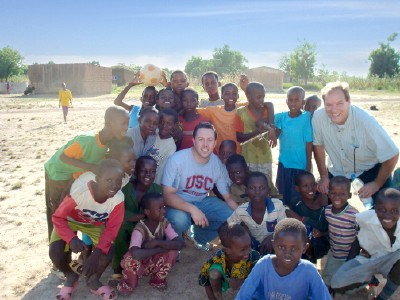Centers of Expertise Offer Opportunities for Fellows, Residents

Kyle Eberlin, center, on a surgical mission in Mali.
Kyle Eberlin, MD, believes his week-long surgical mission in Mali with the Global Smile Foundation will shape his career as a plastic surgeon.
“I gained an important perspective about surgical care in the developing world,” said the third-year Plastic Surgery resident, who performed cleft lip repairs on children and adults on this mission last fall. “I learned that it is essential to understand the cultural and religious perspectives of your patient population in order to fully understand their approach to your surgical care.”
Eberlin’s involvement in the Mali mission was funded through a scholarship from the Graduate Medical Education Center for Expertise in Global Health, one of five centers of expertise that offers training and mentorship opportunities that complement traditional residences and fellowships. The five centers of expertise—which focus on global health, academic health care management, quality and patient safety, health policy and medical education—were created in 2008 to help trainees achieve excellence as clinicians and gain additional learning opportunities based on their talent, motivation and access to outstanding faculty and other resources.
The centers offer access to senior faculty for advice and mentoring, lecture and educational workshops and opportunities to participate in elective experiences, like Eberlin’s mission to Mali and attendance at local and national conferences. The program’s open and flexible structure enables busy residents and fellows to take advantage of various opportunities.
“The centers represent a real opportunity for residents and fellows to delve into an area of possible career interest—or even just an area they want to learn more about,” said Michael Gustafson, MD, MBA, senior vice president of Clinical Excellence who co-chairs the center for Academic Health Care Management with Jean Elrick, MD, senior vice president of MGH. “As a side benefit, they have allowed residents to connect across traditional department boundaries and across institutions.”
That aspect is especially important, according to Maya Yiadom, MD, MPH. “The fact that the centers are Partners-wide is helpful in facilitating networking and mentorship,” said the third-year Emergency Medicine resident.
In December, she received a stipend through the centers to attend an Institute for Healthcare Improvement conference. “It was phenomenal given my growing interest in process improvement,” said Yiadom. “It’s a huge luxury to be a resident and have these kinds of opportunities.”
Gustafson noted that in the Center of Expertise on Academic Health Care Management, trainees are exposed to a wide range of ways that physicians can become involved in health care leadership. “There are so many opportunities—from directing a local practice or health center to managing an operational area like the ORs to leading an academic department to running a hospital or health care system,” Gustafson said.
Monthly leadership sessions address mentoring, life-planning and content. “Residents always wants to know: ‘How did you get where you are,’ and these small lectures provide them contact with leadership to answer their questions and give advice,” said Jennifer Goldsmith, administrative director of Partners Graduate Medical Education.
Daniel Stein, MD, a first-year resident in Internal Medicine, has found time to attend a number of the lectures—mostly those focusing on health management and health policy—and appreciates the informal presentations with speakers. “Because it’s informal, you can really engage with the speaker and other residents and fellows,” said Stein, who worked in health policy prior to beginning residency.
The centers for Medical Education and Health Policy are still in the development stages. James J. Mongan, MD, former president and CEO of Partners, will head the Center of Expertise in Health Policy. For more information, e-mail phsgmeoffice@partners.org